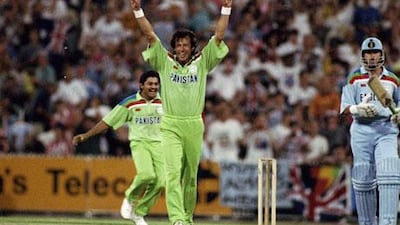The social landscape in Pakistan is dotted with a myriad of cricket games, crammed in restricted space, throughout the land.
Although the poorer regions -such as Balochistan, interior Sind and southern and western Punjab - remain under-represented in the national team, cricket is the nearest thing to the national game in Pakistan. In the first Test match Pakistan played, the team was made up of seven players born in Lahore and four who were born in Indian territory.
Cricket has clearly expanded geographically in Pakistan since then. However, it has also witnessed a growth in its social base, from players from mainly privileged backgrounds in the early days to players from a greater variety of classes as it is today.
This growth had a significant impact in the emergence of a more defiant spirit in the 1970s.
In the early years, many of the cricketers who represented Pakistan were educated and affluent, who had learnt their cricket in the collegial system based on British educational institutions.
These players were more subservient and deferential in spirit. So in 1971 when Pakistan arrived in England, Imran Khan noted in his autobiography, the pervasion of an "inferiority complex" among Pakistani players.
The emergence of players from poorer backgrounds paved the way for cricket to be a field where there was an assertive expression of identity.
Success encouraged a focus on the cricket team as symbolically embodying Pakistan unity, identity aspirations and pride. And success has not come any bigger than the 1992 World Cup, still considered the high point for Pakistan cricket.
Pakistan cricket, when successful like it was in 1992, can transcend particularistic identities in a nation with all too apparent fault-lines.
This is the special value of the game in Pakistan.
As Pakistan cricket does not belong to any province, ethnic or kinship groups (biraderis), or sectarian interests, Pakistan cricket can be a unifier, even if only a temporary one, as it was in 1992.
An economically poor nation, it has often felt a victim of the prejudices of "outsiders". Pakistan has throughout its history also suffered great a deal of internal turbulence. For some, therefore, the result of the 1992 World Cup was both a bolster to self-esteem and a slap in the face of critics who have constantly denigrated the country.
The 1992 success also encouraged the link between cricket and Pakistani identity.
Pakistani pride as expressed in cricket had become explicit by the 1996 World Cup. This could be clearly seen from the band Junoon's song - Jasbaan-e-Junoon (The Joy of Madness).
The video was juxtaposed with images of the Pakistan squad as well as "back alley" cricketers. It was a song redolent with nationalism, seen in lines such as (when translated into English): "Never forget Pakistan, Pakistan is yours, Pakistan is ours and never forget your identity."
The 1992 World Cup triumph also inspired countless numbers. One such person was Shoaib Akhtar, whose interest in cricket was sparked by watching Wasim Akram's masterful spell of fast bowling that turned the final decisively in favour of Pakistan.
Pakistan's solitary World Cup success created new hopes and dreams, but also etched into the consciousness happy memories for Pakistanis.
They remember fondly Imran Khan's incorrigible belief in the team and inspirational captaincy; Inzamam-ul-Haq's thunderous semi-final innings; Javed Miandad's skill in constructing an innings; Wasim's sensational spell in the final. Even Imran's clarion call to "fight like cornered tigers" is often recalled.
At the same time it should also not be forgotten that the World Cup victory was not wholly positive. Players high on success were now wielding their inflated egos.
Mushtaq Ahmed candidly admitted in his autobiography that the players "first thoughts turned to materialistic things". But for many fans the positive memories outweigh such matters.
The memories that the "against the odds" triumph evoke are especially stirring when you consider the depths that Pakistan cricket has sunk to.
In the past few years, Pakistan went through a whole year (2007) without playing a single Test, players have been banned for drugs and international cricket has ceased in Pakistan after an attack on the Sri Lankan cricket team in Lahore.
The 2009 victory in England in the Twenty20 World Cup provided some respite and cheer for beleaguered Pakistan cricket fans, but it proved to be a false dawn.
Soon afterwards players sought to topple Younus Khan as captain, even willing to underperform to achieve their aim.
More recently, two of the country's most talented bowlers and a former captain have been banned for spot fixing.
Yet even these travails on the cricket field appear relatively insignificant for ordinary Pakistanis, whose remarkable resilience has been a constant in the nation's chequered history.
They are currently being pulverised by terrorism, recovering from devastating floods and being badly squeezed by inflation.
In such circumstances, memories of the 1992 World Cup are more nostalgic. Success in the forthcoming World Cup would mean more than just sporting pride; it would uplift and provide succour to millions, even if only for a transient period.
The Pakistan cricket team face a tall order. They are not among the favourites for the World Cup. It would be a surprise if they lifted the trophy in Mumbai on 2 April.
But perhaps the memories of the 1992 World Cup could act as a force to inspire them to "fight like cornered tigers". Millions in Pakistan may not be expecting this to happen, but they will certainly be hoping it does.
It is hope made poignant by the plight of the ordinary citizen.

